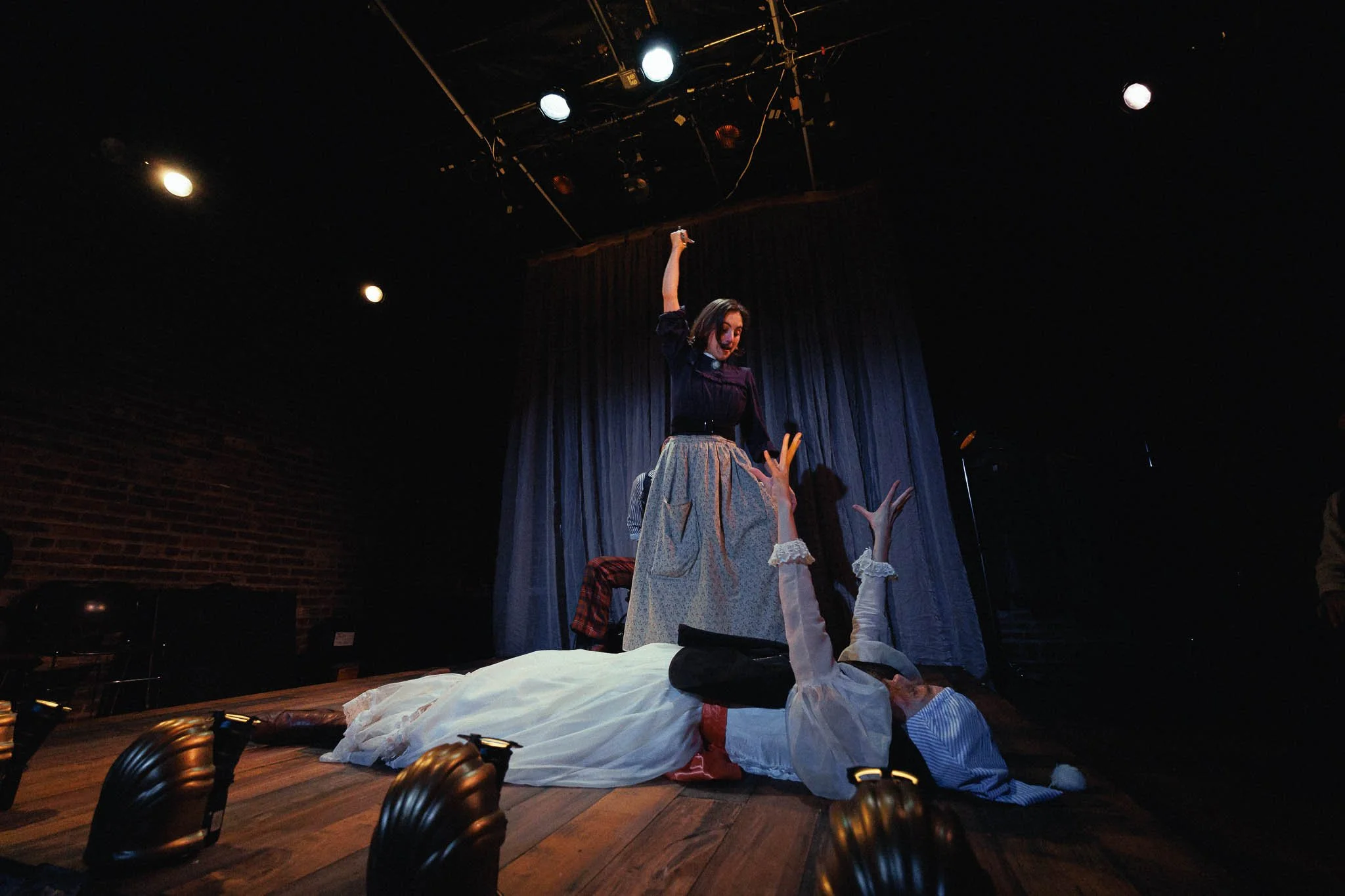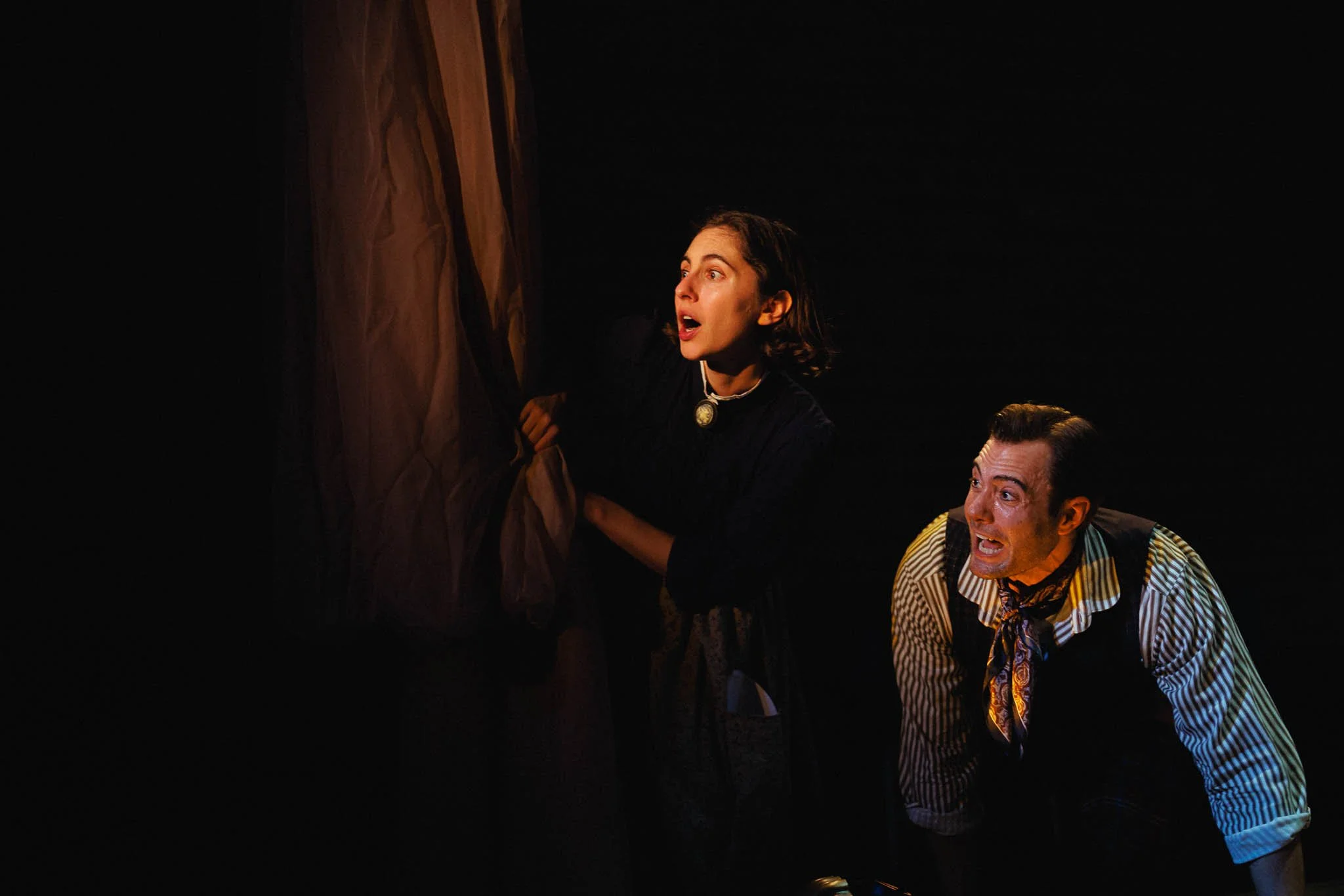Show Response: Jewish Plot
Madeline Weinstein and Tess Frazer
by Reuven Glezer
There was a point where, right before Torrey Townsend’s Jewish Plot took flight, I was afraid that the play had lost me. I love that feeling. “Is this it?” I thought. But I’m always happy to be wrong, and a deep part of me knew I would be, but that’s the joy of it. The writer of The Workshop and Off Broadway, Townsend’s writing is almost Bernhardian in nature - scathing, observant, venturing not into the weird but into the pit of the pit. There’s strangeness, but a kind of strangeness that feels electric. I watched, slowly, as Sarah Hughes’ production morphs from meta to a kind of meta-meta that uplifts the work's moral center with a skill so bracing and ingenious that I couldn’t help but laugh in a kind of joyful, excited understanding that I had seen something special.
Jewish Plot is, on the surface, a theatrical recreation of a lost Victorian melodrama by one I.W. Bruntmole, recreated by Townsend with the help of the work’s anchor, the brilliant Madeline Weinstein, and the now-mysteriously reduced cast of 4, rounded out by Tess Frazer, Neil D’Astolfo, and Eddie Kaye Thomas. We’re told by Weinstein that what we’re seeing is a scrappier version of the intended recreation - the production has lost cast members, its band, its director - and that this project has been years in the making. Act 2 isn’t even finished yet, pages are being written as we speak, and we’ll experience that as half as a reading.
It’s all fun & games until it’s not. It’s a pleasure watching D’Astolfo, Frazer, and Thomas ham it up in Victorian melodramatic hijinks mode (with Weinstein on stage directions and an equal partner in said hijinks) and then the play reveals its true nature, to chilling effect.
This is the part where I can’t really spoil where Act 2 of Jewish Plot goes, but I can say this - it’s like watching the real-time decomposition of someone’s soul and identity. It’s perhaps no secret at this point is that the work confronts Jewishness’s devolution from faith and identity into a dog whistle for genocide excusal and encouragement. Townsend asks us forthright - as an active participant in an art world that values the same five stories about Jews on stage over & over, as the grandson of one of the architects of the Zionist project - what the fuck is being Jewish anymore in the face of endless destruction?
A crisis of faith amongst Jewish artists about their role in the world while the State of Israel commits mass murder on a daily basis is also nothing new, but my Gd have we fucked it up in confronting the entity that claims our hearts, claims our very souls, for the endless bloodthirst that is the “war” in Gaza. I have seen more dead children in the past two years than I thought I’d witness in my lifespan, and yet here we are, stiller than an Antarctic ice sheet, having done next-to-nothing for the people of Palestine.
But sure, commission yet another play about the Holocaust. About the Polish ghetto. Or go see Jewish Plot and see what we’ve done to ourselves because if there’s anything close to witnessing the festering rot at the heart of liberal Jewish life, it’s Weinstein reading the horrifying monologue that closes the play. We’re all in it now, in an orgiastic frenzy of death and money and blood so thick that we can’t see past our bylines for Hey Alma. The Nazis in Congress will not save you, will not save us, will not save anyone until the horn is blown and the world is in their oil-stained hands and yet there it is, a willful ignorance of the facts in favor of a monopoly on genocide.
Jewish Plot understands this in a way I’ve seen no other work even attempt to confront, in all its thorn-like cleverness and astounding design; Frank J. Oliva’s set is a gorgeous treasure, Jordan Barnett’s lights create a mood so thick I could dip my hands in it, Peter Mills Weiss’ & Robin Margolis’ sound is so cleverly forged, and the costumes? Caity Mulkearns deserves some kind of award for the dresses alone, for a start.
You’ll feel like you’re bleeding after, and you’ll be grateful for it.
Madeline Weinstein and Neil D'Astolfo
All photos by Ken Yotsukura


